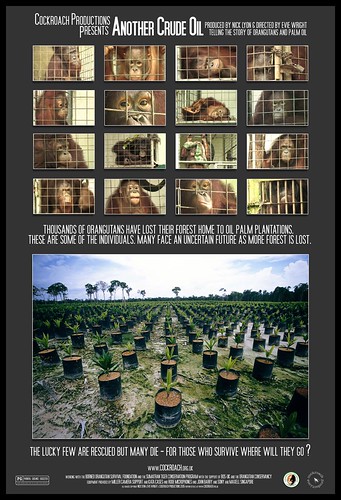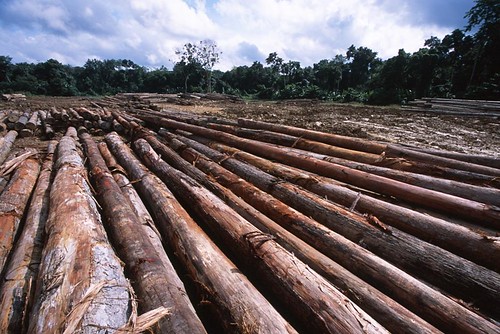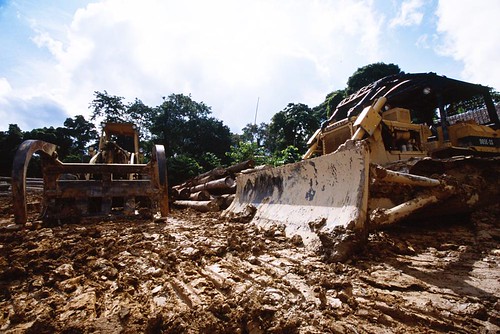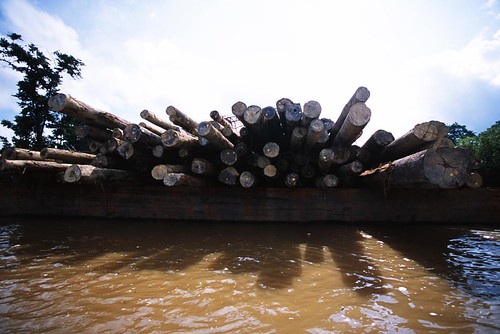Another Crude Oil - Taster Poster

All images copyright Cockroach Productions 2005
For further info please contact Nick or Evie @
tel: 01823 451 790
email: cockroachproductions@gmail.com
Conservation Film Blog. Home of the Orangutan Film Protection Project. Where documentary film meets conservation.

All images copyright Cockroach Productions 2005
For further info please contact Nick or Evie @
tel: 01823 451 790
email: cockroachproductions@gmail.com
Posted by
Films4Conservation
at
4:45 pm
0
comments
![]()
Labels: OFPP news
Today marks the first day of the United Nations climate conference in Montreal. Whilst the agenda will address how the goals of Kyoto will be met within the first period (expiring in 2012) we are more interested in what they will be discussing for the longer term. At present Kyoto makes no economic provisions for preservation of existing forest, rather it rewards reforesting (replanting of natural forest) and aforestry (growing plantations on land that is no longer forested). Whilst this was set up to develop a proactive solution to CO2 emissions, time is telling us that huge tracts of valuable forest are being lost because of their exclusion from Kyoto.

Valuable timber is the real reason much of the peat swamps are being cleared. The land is not suitable for oil palm development
Is reforestation more important that forest protection?
Our hopes for Montreal are that issues of forest preservation will be addressed and factored into the second period. One might hope that emergency protocol could be called into effect, because by 2012 we may well have lost much of the natural forest cover we are striving to protect – but this seems unlikely. It is important to note that preservation of forest goes above and beyond the importance of protection of traditional lifestyles and preservation of species. We at Cockroach are working hard to champion the causes of forest peoples who appear not to be in control of their futures as palm oil moves into their traditional lands. We have recognized the desperate plight of such charismatic and endangered species such as the orangutan, the Sumatran tiger, the jungle elephants, the
gibbons and siamang… the list goes on. But perhaps there is a reason closer to home that might end up being what saves Indonesia’s natural forests…

Bulldozers 'should' be used to clear vegetation for plantations on dry land, clearance by fire is illegal. On peat the ground is too soft and tha machines would sink. This means that fire is often used, and this is a CO2 disaster as the fire penetrates peat that runs 20 metres thick in some places. Burning for plantation clearance is illegal, but happens time after time, even in dry forest, because it is cheaper than using machines.
Peat Swamp, and what it should mean to us.
Whilst forest people and exotic species might captivate the interest of the public, there is a geographical remoteness that might let them fall from consciousness when overrun with the priorities of our busy lives. There is another factor closer to home that we should be recognizing. Animals and people might be losing their homes on the other side of the world, but we are suffering directly as a result. The case for global climate change grows stronger with each passing year. General scientific consensus supports the claims that the planet is warming, and the risks associated with this are well known. Indonesia is a special case. Not only does it harbour magnificent rainforests that we rely on for oxygen production, but it holds huge reserves of carbon, locked up in biological matter called peat. 30% of terrestrial carbon is locked up in peat, and Indonesia holds 50% of the worlds peat swamp. These areas are now under threat. Palm oil is THE major threat. Concessions of forest for conversion to oil palm plantation are logged out. The peat dries without its protective forest cover, compounded by logging canals draining the peat. With these peat swamps facing conversion we need to raise the question – shouldn’t Kyoto have made provisions to protect this carbon dioxide timebomb? We can only hope that Montreal will address this issue.

We witnessed thousands of trees being floated down the rivers of Borneo. These beautiful waterways are now like a funeral procession. It is heartbreaking to see. Very little primary forest borders any of these rivers anymore. Access is key.
Posted by
Films4Conservation
at
8:39 am
0
comments
![]()
Posted by
Films4Conservation
at
3:07 pm
0
comments
![]()
Posted by
Films4Conservation
at
10:18 pm
0
comments
![]()



